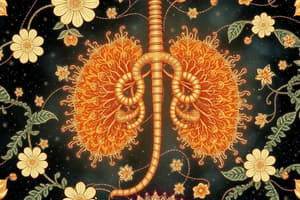Podcast
Questions and Answers
What is the restoration theory?
What is the restoration theory?
According to the restoration theory, sleep is essential for revitalising and restoring the physiological processes that keep the body and mind healthy and properly functioning after the day's activities.
What does the restoration of the body during sleep include? (Select all that apply)
What does the restoration of the body during sleep include? (Select all that apply)
- Repairs to cells (correct)
- Enhancement of cognitive functions
- Removal of waste chemicals (correct)
- Restoring resources of energy (correct)
What is restored in the brain during sleep?
What is restored in the brain during sleep?
- Muscle strength
- Neurotransmitters (correct)
- Nutrient levels
- Vision clarity
What is the role of NREM and REM sleep according to the theory?
What is the role of NREM and REM sleep according to the theory?
What significant effect did Peter Tripp's lack of sleep have?
What significant effect did Peter Tripp's lack of sleep have?
What conflicting evidence exists regarding sleep's role in bodily restoration?
What conflicting evidence exists regarding sleep's role in bodily restoration?
What did Horne (1978) find about sleep and sports performance?
What did Horne (1978) find about sleep and sports performance?
What does evidence from sleep-deprived animals suggest?
What does evidence from sleep-deprived animals suggest?
What does the theory imply about injuries and sleeplessness?
What does the theory imply about injuries and sleeplessness?
What role does sleep play in memory and problem-solving?
What role does sleep play in memory and problem-solving?
What happens during sleep that suggests support for growth?
What happens during sleep that suggests support for growth?
What was discovered in a study involving sleep-deprived rats?
What was discovered in a study involving sleep-deprived rats?
Flashcards are hidden until you start studying
Study Notes
Restoration Theory Overview
- Sleep is crucial for revitalizing and restoring both physiological and mental health following daily activities.
- According to Oswald (1966), sleep supports healthy body and mind functioning.
Restoration of the Body
- Sleep facilitates cell repair and recovery processes.
- Energy resources, specifically glycogen, are replenished during sleep.
- Waste chemicals that accumulate throughout the day are effectively removed during sleep.
Restoration of the Brain
- Sleep provides the brain with necessary rest.
- Neurotransmitters and brain proteins are replenished during sleep, supporting neurological health.
NREM and REM Sleep
- NREM sleep is vital for restoring physiological functions.
- REM sleep plays a key role in restoring cognitive and mental functions.
Strengths of Restoration Theory
- The theory is well-supported by research, highlighting the critical nature of sleep for brain health.
- Case study: Peter Tripp experienced severe hallucinations and delusions after eight days without sleep, demonstrating the need for sleep in restoring brain function.
- It accounts for all sleep stages, explaining the significance of both NREM and REM sleep for overall restoration.
Weaknesses of Restoration Theory
- Conflicting evidence regarding the body's restoration during sleep; some argue it's primarily the brain that benefits.
- Research suggests that adequate rest alone can lead to bodily recovery, independent of sleep.
- Findings by Horne (1978) indicate that sleep does not significantly affect athletic performance, challenging the theory's claims.
- Certain animals, like dolphins and seals, exhibit minimal REM sleep without negative consequences, questioning the necessity of REM for restoration.
Analysis of Restoration Theory
- The theory suggests REM sleep is critical for brain restoration, with impaired function expected during sleep deprivation.
- Studies show sleep is significant for memory, problem-solving, and mood regulation, aligning with the theory’s premise of brain restoration.
- Inducing comas in brain trauma patients illustrates the practical applications of the theory, aiding in brain recovery.
- Increased growth hormone secretion during sleep supports the need for prolonged sleep in rapidly growing individuals, such as infants and adolescents.
- Research on sleep-deprived rats demonstrated that lack of sleep can lead to death within 23 days, underscoring the essential role sleep plays in survival.
Studying That Suits You
Use AI to generate personalized quizzes and flashcards to suit your learning preferences.




